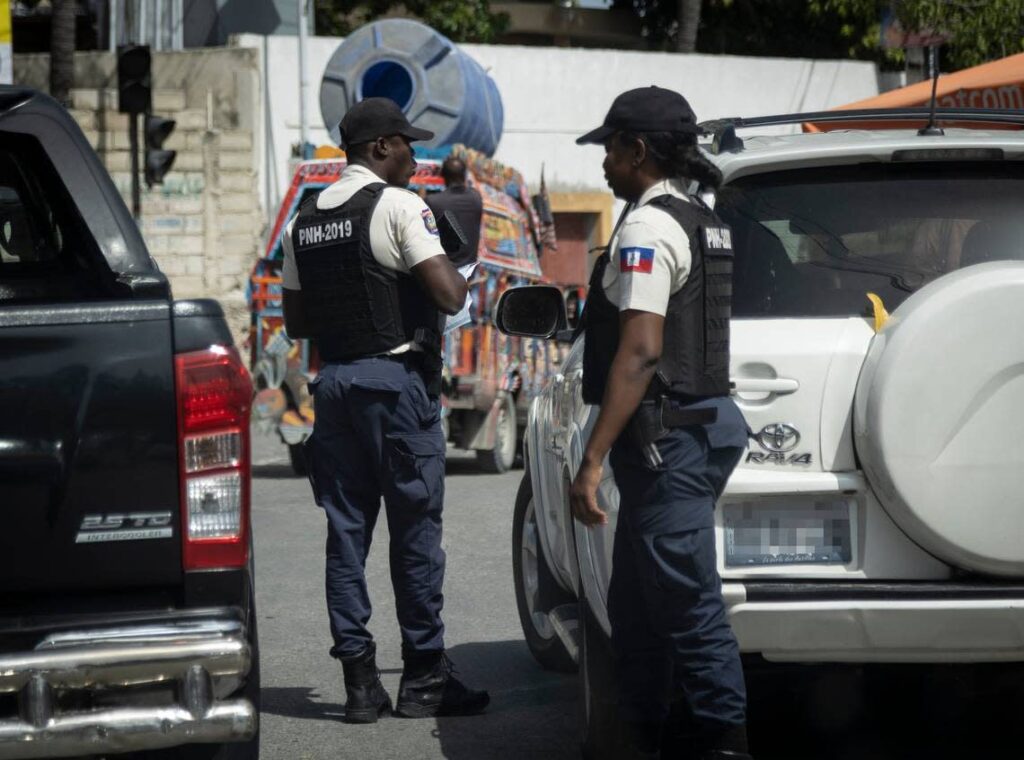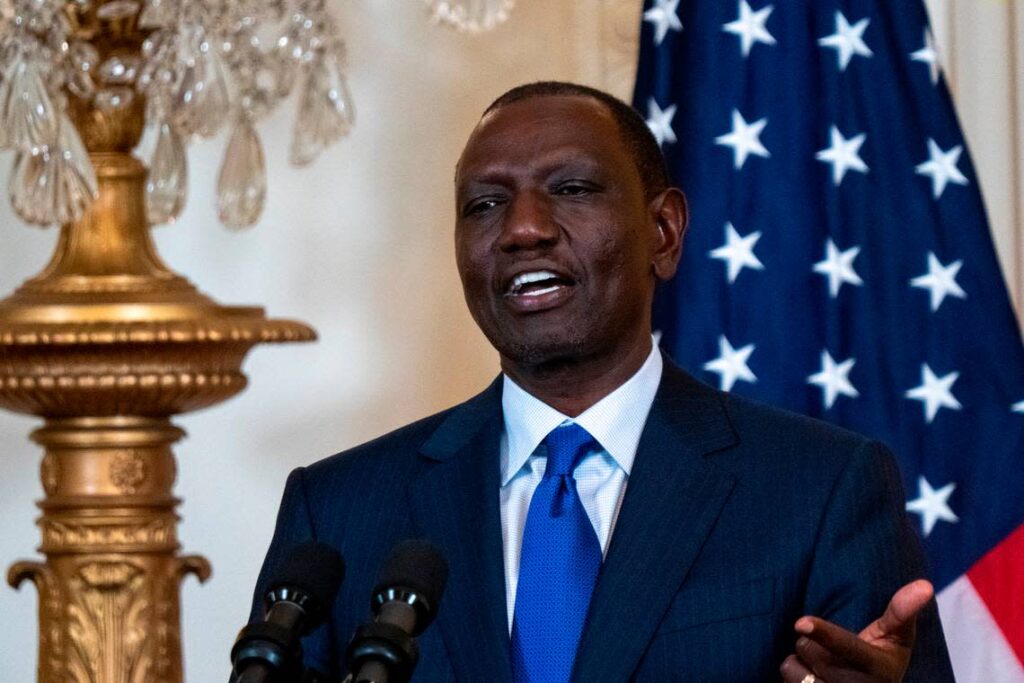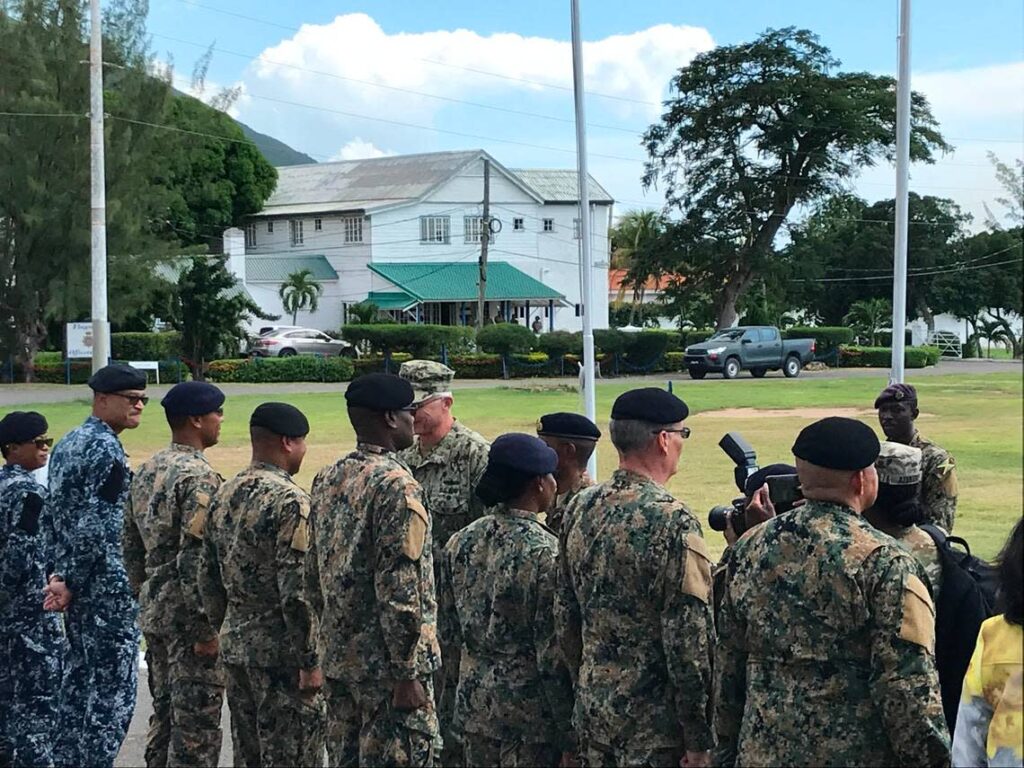PORT-AU-PRINCE — Kenyan President William Ruto, back in Nairobi following his recent three-day state visit to the United States, is voicing confidence that a security mission to Haiti that his East African nation will lead will go ahead.
Ruto made the assertion in a post on X, following what he described as “a comprehensive” briefing from his team of security experts that visited Port-au-Prince last month to assess the ongoing preparations for the deployment of Kenyan police officers tasked with leading a 2,500-member multinational security support mission to the volatile Caribbean nation.
The highly anticipated mission, first approved by the United Nations Security Council in October, has been delayed by financial constraints and court challenges. Meantime, Haiti has been hit by some of the deadliest violence in recent years. More than 2,500 Haitians have been killed or injured since January, according to the U.N., and an additional 90,000 people in a gang-controlled Port-au-Prince have been forced from their homes, bringing the number of displaced Haitians to over 360,000 over the last three years.

The country’s main seaport and international airport were shuttered, although both have recently resumed operations, which will allow the first contingent of the Kenya-led Multinational Security Support mission to arrive. When that will be, however, remains a mystery.
Many questions remain about the mission, which faces another legal challenge in Nairobi and continues to lack financial and logistics support from the international community. There is confusion about whether the foreign cops being deployed to Haiti will be involved in combating gangs, or tasked solely with protecting key government infrastructures such as the airport, seaport, the presidential palace and main roads. Ruto and other Kenyan officials have refrained from providing specifics.
While Haitian police have said they want the Kenyans’ help in dismantling the roughly 300 armed gangs running around the country, sources tell the Miami Herald that the idea of having the Kenyans protect infrastructure — what is being referred to as a “static” force — rather than battle gangs hand in hand with Haitian cops, is back on the table.
The reason appears to be the ongoing surge in violence that erupted on Feb. 29 after armed gangs united in an effort to oust Henry and topple his embattled government. The chaos and lawlessness led some countries and police to rethink their involvement in the crisis.
At the time the united attacks began, Henry had just finalized an agreement for Kenya to lead the security mission, a deal both Ruto and U.S. officials say remains in effect despite Henry’s forced resignation by Washington and the installation of a presidential transitional council. The council tapped a longtime United Nations civil servant, Garry Conille, to head Haiti’s next government.
On Monday, Conille was given his official papers, which now allows him to begin forming a cabinet and working to restore order. The day before he toured the center of downtown where gangs have looted and burned dozens of pharmacies, forced the closure of the largest public hospital and brought Haiti to the brink of a humanitarian catastrophe.
So where things stand in Haiti and with the Multinational Security Support mission, known as the MSS?
Here is the latest.

Why Kenya is taking the lead
In October, the U.N. Security Council passed a resolution authorizing the deployment of the mission to Haiti. The resolution provides the framework for the deployment. Though sanctioned by the U.N., the force is not a U.N. peacekeeping mission. It is a lot smaller, and the funding will come from voluntary donations as opposed to assessed contributions from U.N. member states.
Critics of the international intervention have raised concerns that Kenya, a former British colony and English-speaking nation in East Africa, is leading a deployment to Haiti, a French- and Haitian-Creole speaking-nation 12,000 miles away.
Prior to Kenya volunteering in July to assist Haiti, the U.S. and Henry reached out to several nations asking for help to put down the escalating violence. Kenya was the only one that raised its hand after other countries, including Canada and Brazil, declined.
Ruto has said Kenya has a moral obligation to assist Haiti. He offered to lead the mission after getting together with Henry in Paris and then meeting with a U.S. delegation in Nairobi led by Todd Robinson, U.S. assistant secretary for the Bureau of International Narcotics and Law Enforcement Affairs. But Ruto had conditions: his security team needed to make an assessment of the security situation, the operation needed to be green-lighted by the U.N. Security Council and the Kenyan parliament had to agree to the deployment.
Parliament’s approval came with its own caveat: the mission needs to be funded by the international community.
Other countries involved
In addition to Kenya, seven other countries have now officially notified the U.N. that they will provided personnel: The Bahamas, Bangladesh, Barbados, Belize, Benin, Chad and Jamaica.
The Biden administration made clear that U.S. forces will not part of the mission. “It just raises all kinds of questions that can be easily misrepresented by what we’re trying to do, and be able to be used by those who disagree with us and against the interest of Haiti and the United States,” President Biden recently said.
Arrival of the force
It was announced that the first contingent of Kenyan cops would arrive in Haiti around the time of Ruto’s May 23 visit with President Biden at the White House. That didn’t happen. The Kenyan security team visiting Haiti around the same time found critical shortages of equipment that led to a delay in deployment, including communication gear and a helicopter to evacuate casualties. The Kenyans also want their own armored vehicles and do not want to have to share with Haitian cops.
Prior to leaving Washington, Ruto told the British Broadcasting Corp. that he expects the Kenyan force to arrive in Haiti in about three weeks. That was about two weeks ago. So far, there no definitive date has been given.
The initial deployment
No one involved in the deployment has provided specifics. Numbers for the first contingent have ranged from 120 to 200, including support staff. During an interview with Citizen TV Kenya, Kenya Foreign Minister Musalia Mudavadi declined to confirm any numbers.
“This is an operational issue,” he said, stressing that “this is a multinational security support mission. It’s not a singular mission of Kenya, so there’s a lot of consultations” going on.
The deployment will be strategic… and we are sure that with time, the experts on security deployment will be able to have enough boots on the ground to deal with the crisis,” the minister added.
Paying for the mission
The U.S. is the main donor for the mission, but the Biden administration is having a hard time getting skeptical Republicans in Congress onboard. Of the $300 million the administration has pledged, $200 million is from the Defense Department; the other $100 million is supposed to come from the State Department.
U.S. Sen. Jim Risch, R-Idaho, ranking member of the Senate Foreign Relations Committee, and U.S. Representative Michael McCaul, R-Texas, chairman of the House Foreign Affairs Committee, have raised issues about the mission and blocked $40 million in funds the administration seeks. The lawmakers question the plan and have accused the administration of not being transparent. The administration has responded it has provided dozens of briefings, and that the situation on the ground in Haiti changes by the day.
A trust fund managed by the U.N. for the security mission has only raised $21 million. Experts fear that if the initial forces cannot be quickly bolstered once deployed to Haiti, the security situation will further deteriorate and gangs may grow even more powerful. The gangs currently control more than 80% of the capital and are responsible for the recent deaths of two young American missionaries.
Base of operations
The Kenyan force will operate out of a base currently under construction by the Pentagon. U.S. officials have been tight-lipped about the space including whether members of the mission will actually be housed on the site, or just be headquartered there.
Despite attempts to keep images of the base out of the public view due to security concerns, the public got its first glimpse last week when a member of the presidential transitional council, Leslie Voltaire, visited with a camera.
Voltaire “visited the dormitory, medical center, cafeteria and many other spaces that will serve the foreign soldiers,” the council posted on X, showing Voltaire shaking hands with some of the civilian contractors on the site, located on part of what was once occupied by U.N. peacekeepers.
To get the base ready the base and prepare for the forces’ arrival, the Doral-based U.S. Southern Command has coordinated the landing so far of 84 military flights at Toussaint Louverture International Airport with construction materials.
Legal roadblocks
From the beginning the Kenya-led mission has faced legal roadblocks in Nairobi, where opposition forces have sought to block the deployment. In January, after months of refusing to allow the police to deploy, the High Court in Nairobi ruled that deployment is unconstitutional because there was no reciprocal security agreement between Haiti and Kenya.
After such an agreement was signed in late February, and the deployment was once more back on, a new lawsuit was filed against the Ruto government. This time, opposition groups are accusing the government of “blatant disregard” for the January court order. They want the government held in contempt and the deployment stopped.
Ruto’s government previously said the new lawsuit has no bearing on deployment plans. A court hearing has been scheduled for June 12.
The makeup of the force
All members of the force must be vetted by the United States for, among other things, previous accusations of human-rights violations. As of April, there were approximately 400 Kenyans who had been vetted and approved for the mission, along with about 250 Jamaicans. Jamaica is the Caribbean Community’s lead for the force. The Kenyan officers, meanwhile, are being drawn from several law enforcement units, including those with experience in counterterrorism operations. The mission is supposed to be headed by a force commander, a chief of operations and a special civilian representative from contributing countries.
The human-rights issue
The poor human-rights record of Kenyan police has come under scrutiny ever since the country pledged to help, but it’s not just the Kenyans critics are worried about.
In a statement issued last week, Human Rights Watch said “a key question is whether the countries involved are taking sufficient steps to ensure the MSS respects human rights.”
There were human-rights abuses in past international responses in Haiti: U.N. troops were accused of sexual violence and introducing cholera after the country’s devastating 2010 earthquake. Human Rights Watch said members of the U.N. Security Council should demand that troop-contributing countries “implement a robust human rights due diligence policy, including an independent oversight mechanism, involving Haitian civil society, to monitor and report on the conduct of the Haitian National Police and MSS personnel.”
The chain of command
There has been confusion about who the mission will report to.
Kenyan officials have sought to clarify the confusion in recent interviews, dismissing reports that the Haitian police will oversee the operation and that a yet to be established National Security Council will supervise and define the mission’s assistance.
“It’s a security support mission and the framework upon which they will work is [being] negotiated,” Mudavadi, the Kenyan foreign minister, said. “There’s a framework that is agreed upon, a framework that is going to be followed to make sure that the deployment is in accordance with the expectations of the people of Haiti and with the United Nations.”
Lack of clarity
Recent comments out of Haiti and Kenya have led to more confusion.
Voltaire, one of the more outspoken members of the presidential council, said the foreign police officers will train and equip the Haitian police and will not directly fight the gangs.
But the Kenyans and others have made conflicting comments. Mudavadi, for example, has dismissed reports that 2,000 Haitian police officers will be trained by the Kenyans.
“This is not a mission where the deployed people are going for what you might call straight-on combat. It is a security support mission,” he said. “Definitely there could be encounters that may arise along the way. But the responses must be in accordance with the guidance provided within the deployment framework and within the guidance of the United Nations.”
By JACQUELINE CHAR.ES/Miami Herald



